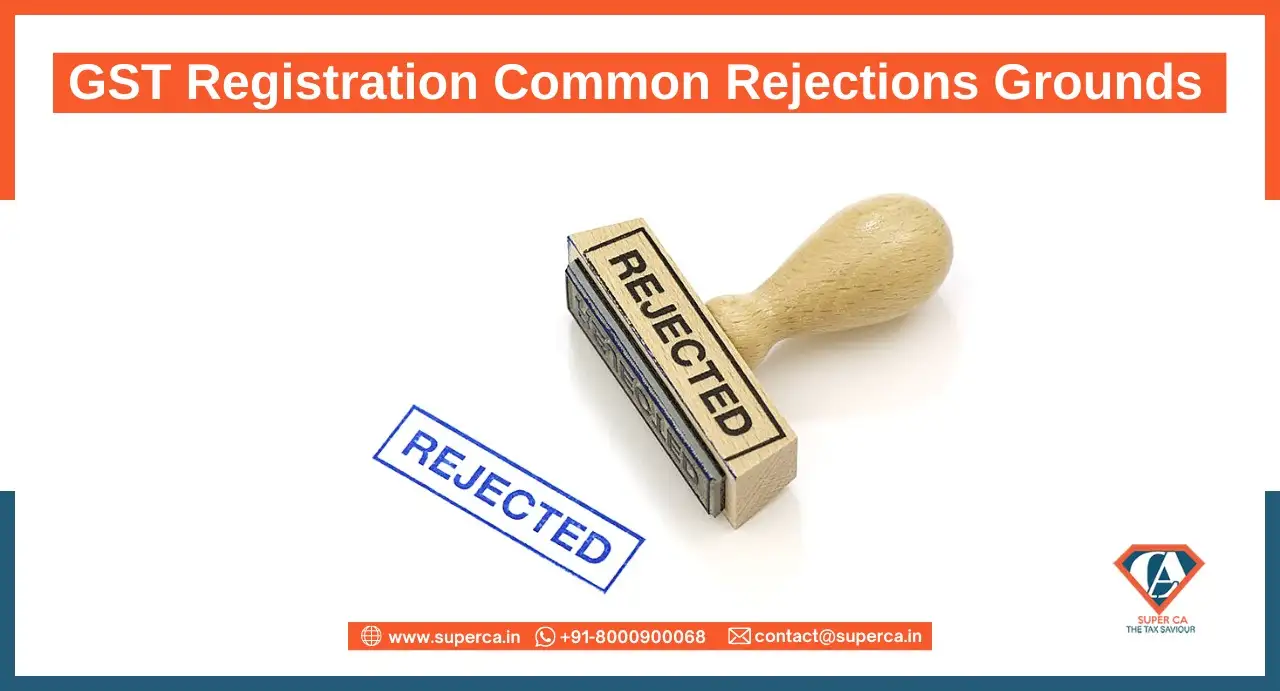GST Registration Common Rejections Grounds
- Posted By SuperCA
- On 22 November

About
GST Registration is the process of obtaining a unique identification number by a supplier from the tax authorities. It acts as the identification of the taxpayer. Every supplier/business having turnover of Rs 40 lakhs or more (Rs 10 lakhs for special category states) needs to get registered under GST. The supplier shall be allotted a 15-digit GSTIN (GST identification number) and a certificate of registration by the GST department.
But sometimes after enabling the process of registration and filing all relevant documents, the application gets rejected. This case arises normally if a person fails to provide clarification or provides clarification which is not accepted by the GST officer. In this article, we are going to consider the cases, which lead to the rejection of the application, and the additional documents are requested when the GST application is rejected.
Usual Process of applying for GST Registration.
Normally you will receive the GST registration certificate within 10 working days after all submissions for the registration. However, the processing officer of the GST department requests few applicants to provide additional documents for further clarifications. And in some cases, the application for GST registration could also be denied or rejected.
After submission of your application along with the list of documents required, you will be provided with an acknowledgement. The ARN number (Acknowledgement Reference Number) as mentioned in the application acknowledgement is used to track the status of your application.
It normally takes about 7 working days for the provisional GSTIN to be provided and an additional 2 days for providing the final GSTIN with a soft copy of the GST registration certificate as a soft-copy.
Penalties for Not Registering Under GS
If a GST eligible individual/business carries on business without paying taxes, it will be an offence under GST and penalties will be applied.
If the error of payment is genuine, i.e. unintentional, the individual or business in question has to pay 10% of the total tax. However, this is only applicable if the total tax burden is higher than Rs. 1 Lakh.
If the error of payment is intentional, the culpable entity needs to pay the entire due amount as penalty.
Common Error Grounds
In case you have any mistakes or errors while applying for GST registration, you can correct it in the application for registration either at the time of registration or even afterwards. You must submit FORM GST REG-14 along with documents. The GST officer will be verifying and approving within 15 days in FORM GST REG-15.
The GST application can get rejected due to following reasons -
- If required data is not filled accurately
- If the proof of identity or address of premises is inadequate
- If your PAN card number is not matching. If the mistake occurs in PAN, you will have to file for fresh registration in FORM GST REG-01. This is because the GSTIN number is based on the PAN.
In case the relevant documents or information is not found in the GST registration application, the GST officer processing the application would issue a notice asking for additional information or clarification or documents.
In such cases, the required information or documents as cited by the Officer can be uploaded on the common portal before the due date mentioned in the notice. The authorized officer on getting satisfied with the information provided by you will approve the application. However, the authorized officer has the power to reject the application for the GST certificate, if you failed to provide all the required documents or if you fail to submit it on time. He cannot order for a personal hearing for issuing a new GST registration certificate and shall communicate any information regarding the process of the application or any concerns regarding the registration only through the GST forms.
In case you fail to provide any reply, or if the authorized officer is not satisfied with the reply or if you fail to reply well within the time, he/she can reject the application immediately and pass an order in FORM GST REG -05.
On rejection of a GST registration application, the GST Officer would issue a notice to the applicant. As per the GST regulations, the authorized officer should convey to you in writing along with the reasons for rejection.
In a nutshell, in case you fail to provide clarification to the notice or still the GST officer is not satisfied with the clarification or additional documents. The application initially filed in GST REG-01 is liable to be rejected and the order would be passed in Form GST REG-05.
How to see GST Registration rejection’s cause
The entire summary of rejection can be checked on GST Portal by just entering ARN (Acknowledgement Reference Number). It will show you complete insights into events that led to the rejection of the application. The only thing you need is an ARN number which is given to you after submitting the application.
If your application gets rejected, you will get a chance to reply to the rejection letter. But, if you want to apply for a fresh application then you would have to wait for the final rejection which will take around 10 days. You can apply again once the application is fully rejected.
Advantages of GST Registration
➢ Less compliance
Under the previous tax regime, businesses had to file multiple returns accorded with different indirect taxes – VAT, excise, and service tax. As GST is a unified and singular tax regime, the number of filings has come down, making it less hassling for entities to file a return.
➢ Input tax credit can be claimed or transferred.
Registered persons can claim the ITC on the purchase of goods & services & can utilize the same for payment of taxes due on supply of goods or services.
➢ Interstate Supply
Registered persons can make Interstate sales without any restrictions.
➢ Recognition as a supplier of Goods & Services
The taxpayer will be legally recognized as a supplier of goods or services. He would be legally authorized to collect tax from his customers and pass on the credit of the taxes paid on the goods or services supplied to the purchasers/ recipients.
➢ Eliminates the cascading effect of tax





